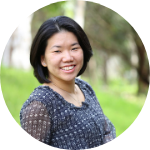The FIGT Research Affiliate kicked off a series of virtual webinars with Dr. Danau Tanu leading a discussion on the concept of “TCK”—its history and its possible future in research.

The FIGT Research Network (FRN) Affiliate kicked off its online seminar series on 29 May 2020 with Dr. Danau Tanu and guest discussants, Dr. Gertina J. van Schalwyk and Dr. Mari Korpela, on the term “Third Culture Kids”—its history and future in research.
The session, hosted by Dr. Anastasia Lijadi, FIGT Research and Education Director, with the help of Sarah Gonzales, Co-Chair of FRN, was joined by an audience of over 75 people that included researchers and practitioners.
It encouraged researchers to rigorously consider the analytical usefulness and pitfalls of the concept “Third Culture Kid” and addressed questions such as:
- “How do I convince my graduate supervisor that ‘Third Culture Kids (TCKs)” is a valid research topic?”
- “Why has the concept of TCKs taken off in the public realm but not in academia?”
Tensions, divisions, and silos
Danau, an anthropologist, began by pointing out an underlying tension surrounding the use of the term “TCK,” between a desire to be inclusive of other experiences—a wider circle that includes other “cross-cultural kids” (CCKs), so named by Dr. Ruth Van Reken, co-author of Third Culture Kids—and the desire to clearly define the boundaries of what constitutes a “Third Culture Kid,” especially when it comes to research.
Another peculiar phenomenon Danau highlighted was the way those researching “TCKs” rarely engage with the broader body of knowledge on mobility and experiences of feeling “in between” and “growing up among worlds,” just as researchers in other related fields don’t tap into the growing knowledge and insights on TCKs since the term first entered the public consciousness in the 1970s.
%201.png)
The history of the “third culture kid” concept in research
In an attempt to explore these tensions and get us thinking about how best to use the “third culture kid” concept in research and translate that knowledge into practical use, Danau took us back in history to the origin of the term (see the bibliography at the end of this article).
Danau began by sharing excerpts from the publications of Dr. Ruth Hill Useem, the sociologist who coined the term “third culture children” in 1973 and who then modified it to “Third-Culture Kids” in a 1976 publication co-authored with Dr. Richard D. Downie.
Going further back to 1955, Danau then showed excerpts from the first work published by Ruth and her husband and fellow sociologist Dr. John Useem on western-educated Indian men and their experiences of crossing culture, some as adults and others as children.
What was most striking about these original works was the deftness with which the Useems handled the diversity of backgrounds and experiences among those who practiced the “third culture” as adults, as well as those who were socialized into it as children.
The Useems (at times with a third colleague) in the 1960s also explored the notion of the “third culture,” whose diverse incarnations can be seen in the motley set of adjectives that the sociologist pair attached to the term including: “colonial third culture”, “paracolonial third culture”, “binational third culture”, “global third culture”, and so on.
Disentangling the “third culture” concept from the “Third Culture Kid” identity
So, what were the key takeaways?
Given that concepts are merely tools to help us understand sociological phenomena, Danau encouraged future scholars to consider disentangling the concept of the “third culture” from the increasing use of the term “Third Culture Kid” as an identity label.
She suggests that this may allow for more flexibility in how we study this growing population. When we realize that scholarly fields have much more in common with each other than we currently acknowledge, it may bridge the gulf that currently exists between those studying so-called “TCKs” and those studying other people crossing culture.
%202.png)
Advice for young scholars
Following Danau’s talk, the discussants contributed their pieces of wisdom. Both Gertina, a psychologist, and Mari, an anthropologist, encouraged younger scholars to keep in mind that even the notion of “culture” is not set in stone—it is fluid, eternally changing, and hard to pin down—and to not lose sight of the fact that their boundaries are socially constructed.
Gertina warned researchers of different disciplines to avoid working in their own silos and recognize that humans are complex beings who need to be understood from different perspectives—psychological, anthropological, sociological, etc.
Mari also advised graduate students to learn to frame their research proposals using concepts that are familiar to their supervisor’s study disciplines to ensure that the proposals are understood.
The session concluded with a general agreement that thinking more critically about the terms is important to both researchers and practitioners.
As Dr. Ruth Van Reken once advised Danau on how to work through issues that may seem contentious:
“Start with the similarities—with what we share—then work through the differences. That way, you’ll be able to find your way back to the similarities.”
 If you would like to join future events organized by the FIGT Research Network (FRN) Affiliate, please go to the FRN webpage to find out how you can stay informed.
If you would like to join future events organized by the FIGT Research Network (FRN) Affiliate, please go to the FRN webpage to find out how you can stay informed.

How to cite this seminar
Tanu, Danau. (2020) “Third Culture Kids”: The History & Future of the Term in Research. Families in Global Transition Research Network Affiliate. [Inaugural virtual seminar, 29 May 2020.]
A bibliography of publications on the history of the term “Third Culture Kid”
Cottrell, Ann. (n.d., circa 2007) Dr. Ruth Hill Useem – the sociologist/anthropologist who first coined the term “Third Culture Kid”. In TCK World: The Official Home of Third Culture Kids. [Retrieved from http://www.tckworld.com/useem/home.html on 27 May 2020.]
Pollock, David, Van Reken, Ruth E., & Pollock, Michael V. (2017) Appendix A: History and Evolution of Third Culture and Third Culture Kids Concepts: Then and Now. In David Pollock, Ruth E. Van Reken, & Michael V. Pollock, Third Culture Kids: Growing Up Among Worlds. London: Nicholas Brealey Publishing. [See FIGT's online bookstore.]
Tanu, Danau. (2015) Toward an Interdisciplinary Analysis of the Diversity of “Third Culture Kids”. In Saija Benjamin & Fred Dervin, Migration, Diversity, and Education: Beyond Third Culture Kids. London: Palgrave Macmillan.
Tanu, Danau. (2018) Growing Up in Transit: The Politics of Belonging at an International School. New York: Berghahn Books. [Note: A discussion of the history of the term “Third Culture Kids” can be found in the “Introduction”, which is downloadable for free from the publisher’s website. The book itself is an anthropological application of the postcolonial perspective on the study of Third Culture Kids. See FIGT’s online bookstore for a discount code for the paperback to be released in December 2020 and a link to the publisher’s website.]
Speaker bios
 Danau Tanu, PhD, is the author of Growing Up in Transit: The Politics of Belonging at an International School and an Honorary Research Fellow at the University of Western Australia. She is also the Co-Chair of the Families in Global Transition (FIGT) Research Network Affiliate.
Danau Tanu, PhD, is the author of Growing Up in Transit: The Politics of Belonging at an International School and an Honorary Research Fellow at the University of Western Australia. She is also the Co-Chair of the Families in Global Transition (FIGT) Research Network Affiliate.
 Gertina J van Schalkwyk, DPhil, is the chief editor of the International Journal of School and Education Psychology, and a former Associate Professor of Psychology at the University of Macau.
Gertina J van Schalkwyk, DPhil, is the chief editor of the International Journal of School and Education Psychology, and a former Associate Professor of Psychology at the University of Macau.
 Mari Korpela, PhD, is a social anthropologist and an Academy Research Fellow at the Faculty of Social Sciences in Tampere University, Finland. Mari is also the President of the Finnish Anthropological Society and the Director of the Lifestyle Migration Hub hosted by Tampere University.
Mari Korpela, PhD, is a social anthropologist and an Academy Research Fellow at the Faculty of Social Sciences in Tampere University, Finland. Mari is also the President of the Finnish Anthropological Society and the Director of the Lifestyle Migration Hub hosted by Tampere University.
 Anastasia Aldelina Lijadi, PhD, is a psychologist and a research scholar in the World Population Department at the International Institute of Applied System Analysis in Austria. She is also the Research and Education Director of FIGT.
Anastasia Aldelina Lijadi, PhD, is a psychologist and a research scholar in the World Population Department at the International Institute of Applied System Analysis in Austria. She is also the Research and Education Director of FIGT.
[Written by Danau Tanu; edited by Ema Naito]